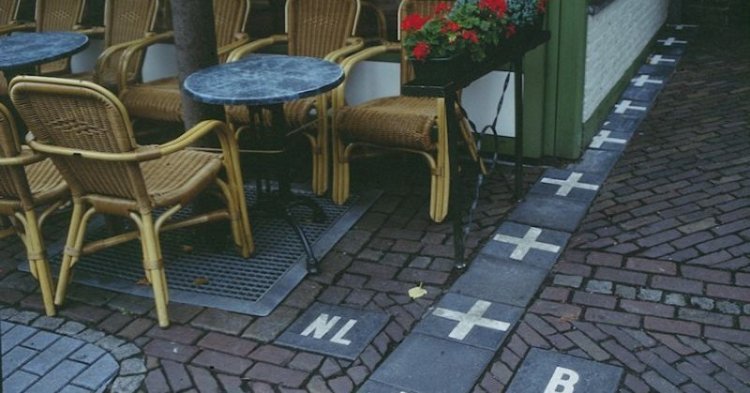Everything started when, fleeing North Africa, 28000 undocumented immigrants landed on the Italian coasts of Lampedusa. Italian gave them residence permits in mass, while providing them with travelling documents. The idea, as expressed back then by the Italian Interior Minister, was to enable those migrants to go to other Member States so that Italy would avoid migratory pressure –this pressure being very relative, as 28000 migrants for a 60 million inhabitants’ country do not represent, in our view, a problem.
France, worried by this alleged migratory « wave », therefore took the decision to prevent the entry of a train coming from Italy, considering it was a threat to public order as the train was supposed to transport many of those freshly documented migrants. The two States consequently dived into a legal dispute where everyone, including the European Commission, seems, at first sight, wrong.
Consequently, besides the legal reflections, it is clear that the genuine origin of this story is political. If Schengen is today threatened, European and efficient solutions must found in the long run.
What is Schengen? A ninja weapon?
The Schengen Agreement, signed in 1985, abolished internal borders between 22 Member States of the European Union and three associated countries. The Treaty of Amsterdam incorporated the agreement in 1997; in concrete terms, it gives the European Court of Justice the right to deal with affairs related to it. The system lies on the absence of individual check inside and ‘appropriate measures’ for the external borders of the zone.
The legal dispute: a perfect script for an absurd play?
In the train affair, it seems that most actors did not respect European law. This legal debate can be taken very far due to its complexity… without really leading very far or leading anyone regarding the real reasons and the genuine problems.
The Schengen system abolished borders between participating States. The controls at the entry of the Schengen area are not carried out by European authorities but by the Member States; residence permits are delivered by national authorities as well. Therefore, every decision taken by national administrations has a potential consequence on the entire zone.
A total trust between participating states is therefore necessary for the system, mainly regulated in our case by the Schengen Border Code (SBC), to exist. Among other things, it is forbidden for a Member State to systematically and massively regulate undocumented immigrants.
However, Italy systematically (and not case by case) provided the North-African immigrants arrived between January 1st and April 5th 2011 with documents. Travel documents were also delivered. These two decisions, which were taken unilaterally and do not respect the SBC, have consequences on the whole Schengen area.
The country nevertheless respected EU law by notifying the European Commission, which did not reacted immediately. The Commission is also, therefore, in a dodgy situation regarding its obligations of Guardian of the Treaties.
Italy’s partners in the Schengen area did not take a long time reacting. France was not alone to be offended. The Austrian Interior Minister Maria Fetker qualified, in April 2011, the Italian actions a “violation of the Schengen spirit” risking to lead to the “collapse of the Schengen system”. Therefore, besides France, Germany, Belgium and Austria had threatened to reinstall border control.
Finally, France’s reaction, regarding EU law, seems to be equally questionable. Closing its borders temporarily, for public order reasons –as the SBC provides- seems completely disproportionate for a train transporting roughly 200 French and Italian activists and less than a hundred migrants. France also did not notify the European Commission and the European Parliament as it was supposed to.
Knowing who is wrong or who is right has its importance, particularly regarding a potential ruling by the European Court of Justice. Nevertheless, no one should be misled, the escalation of the events are more political than legal.
The Franco-Italian Summit, a satisfying outcome?
This turf war was apparently settled during a summit between France and Italy, which is good. It underlines the fact that any form of conflict between European partners can and must be resolved before it is too late. However, the solution found is not the right one.
The idea expressed by Paris and Rome is to reintroduce, temporarily, border control within the Schengen area in situations that are not planned by the Schengen code. It will not solve a lot while discarding a strong, symbolic and citizen-friendly measure.
This is not judicial, this is political!
Despite the successful attempt to make believe in a migratory tsunami, the figures must be put into perspective. In total, according to Italian authorities, 28’000 persons have landed illegally in Italy in 2011. 23’000 are Tunisian and 4’680 are Libyan. Comparatively, according to the Council of the European Union, more than 2 million persons enter the Schengen territory… every week.
Neither Italy (60 million inhabitants) nor France (64 million inhabitants) can justify their reaction from a rational economical point of view. Those migrants are not a threat for labor markets or welfare systems. The source of the crisis is political: those migrants are not a problem, they are made a problem.
It should not be forgotten either that those persons did not come to Europe to steal our jobs or benefit from the generosity of a supposedly charitable welfare system. They escaped areas in conflict and in misery. As Member of the European Parliament Daniel Cohn-Bendit very accurately stated on May 10, 2011, during Bosnia war, European countries also delivered residence permits to people escaping the conflict; no scandal at the time, even though the proportions were from five to ten times bigger.
The populist bets and actions of European leaders are therefore unacceptable. Conceiving war refugees, asylum seekers, just because they are African and probably Muslim, as a hot potato to be dropped to the neighbors work for bar-room politics but not for responsible politics; closing your border to a train while planning a massive press campaign is not any better.
Nothing today seems to stop Heads of State and Government with stagnating popularity and worrying for their reelection. With such short-term calculus, if their project is accept, they look like triumphant Joans of Arc; if Brussels struggles, they play the tune of the disconnected Europe, deaf to the real citizens’ expectations.
Yet, they do not serve neither the European interest, neither their national interest by taking one of the most concrete realizations of European integration because of a minimal turf war. If Schengen has deficiencies, they must be solved, for example by pooling the means to control the area’s external borders in a more efficient way or by implementing the European asylum regime present in the Lisbon Treaty. Eventually, as it would be absurd to abandon such an accomplishment for Europe and as it would seriously threaten sixty years of European integration, a common policy of immigration must be introduced in the near future. The survival of Schengen is at stake. A different approach towards immigrants should emerge in Europe as well. When one starts to blame difference, the most visible minorities are the first in line and once intolerance takes up residency, the will to reject more and more is significant.
While Barack Obama is praising immigrants and all they brought to America, Berluskozy’s Europe is drowning in its populism. It would be time to react.


Follow the comments: |
|
